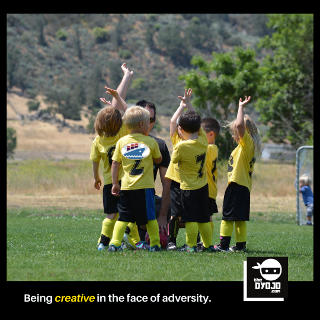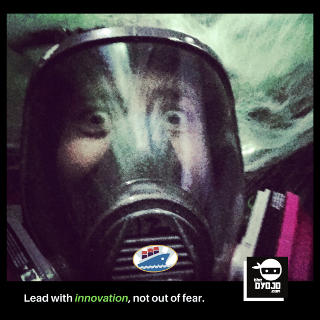COVID-19 is exposing holes in leadership-think and business systems, it's time to adapt or die. When I coached soccer for young kids, every season a unanimous point of contention was running. Ask any coach, if the kids are acting up, “Just make them run.” While conditioning is an essential component of the sport, it’s trite how often running is utilized as a disciplinary tool as well. On the other side of the ball, what do players complain about, “Why do we have to run so much?” I knew it was my role as a coach to teach these kids the fundamentals of soccer and to help them be competitive in our matches, but I understood quickly that if we could make the process enjoyable we would get much further in reaching our goals. Don’t get me wrong, I used to love it when kids whined about conditioning, I would ask, “If you don’t like to run, why did you pick soccer.” Some of them would reply, “I didn’t, my mom is making me play.” Touché. If we put ourselves in the young players mindset, they just spent the day at school sitting in a classroom getting lectured about things many of them are not interested in. They see an open field and their friends and they want to play. As coaches, we decided that we didn’t want to make running a constant punishment, we wanted the kids to enjoy the sport. Yet, we probably ran more than most teams in our league. How you phrase the conversation with affect you ability to implement changesAs we navigate the working world with COVID-19, I can’t help but see some parallels with the above scenario and the discussions around companies attempting to navigate their staff working remotely. I hear several employers contemplating aloud whether employees can be as productive working from home as they are working from the office. We will break some of this down, but one piece of the puzzle I would like to present to those in a position of leadership is how you phrase the conversation. In my coaching days, I discovered a very simple drill. The kids would gather into two lines with one coach in the middle. Coaches would throw a soccer ball as far as they could and the players would run to retrieve it and then scrimmage one-on-one the whole way back. The players literally sprinted to get the ball, they worked on footwork with opposition on the way back and everyone was gasping for air by the time our drill was done. Cardio, skills and scenarios in one simple drill. No one complained about having to run because the running was wrapped into an exercise that we were all doing together. We accomplished quite a bit by being creative. Working remotely is something every company should be experimenting with for the purpose of attracting young talent, providing options to retain existing talent and developing resiliency. Even prior to the novel coronavirus (SARS-CoV-2) outbreak, in the Pacific Northwest there have been many talks about a Cascadia earthquake event as well as other emergency scenarios which should have sparked remote work conversations. The world is changed and your only path to success is forwardThis pandemic is changing our lives and our economy. Life will not be the same once we flatten the curve and develop solutions to COVID-19. So many companies are making bad press for themselves with the public and with their employees through their haphazard actions. As a person in a position of leadership, you will never please everyone, but you must lead. This pandemic is exposing holes in systems worldwide that were not being tightened up because we were all prospering. Now that things are rapidly changing it is time to make adaptations that should have happened long ago. Communication is key. I am thankful that in Tacoma, Washington, the Chamber of Commerce and the Economic Business Development, among others, have been holding tri-weekly updates on facts and resources for local businesses. No one has all of the answers and we are putting this puzzle together one piece at a time. Setting up company updates about:
If you aren’t listening to your employees, you may be missing out on some key opportunities for collaboration and ideas that could save your business. Your concerns about remote work are with your systems not your people There are companies that already have significant portions of their workforce working remotely. I know of one technologically savvy company in the real estate space that provides parameters as well as freedom for their agents. This company has “peak hour” requirements where employees are required to keep a certain amount of their day/week open in those time frames when clients have the most need for service. A process like this demonstrates that the company has a firm grasp on what their clients needs and habits are as well as a means to align their workforce with that business stream. Even before coronavirus, as a person in a position of leadership, you should be asking whether your current process aligns your workforce with your client needs. A common objection to working from home is that employees won’t be as productive. Somehow, people in a position of leadership believe that employees sitting at a desk where they can be observed are somehow more productive. This is like sleeping with the light on when you are scared. It’s ridiculous. If there really is a threat, the presence of a 60 watt bulb will not stop a monster, nor does the “watchful eye” of a “trained manager” increase worker productivity. Setting your team up for success by creating a measurable processI am intentionally not including sources to support my position, if you feel strongly about working from home then you will find research that will support your position (confirmation bias) one way or the other. My contention would be that sitting at a desk is a piss poor metric for productivity. If you are that leader, my questions would be:
In my experience, the same people who judge productivity by butts in seats are the same companies that have no real systems for performance evaluation or improvement. Now is the time to get real about what a productive employee looks like in your organization. When I was coaching, it was the same thing there, coaches would brag about how often their kids ran because they were misbehaving. Many of them had terrible teams full of players who didn’t enjoy the sport and had no passion for learning. Too often as coaches or people in a position of leadership we blame the employee or the player. Soccer is supposed to be fun. It’s a hard game but it’s a blast if you can learn to improve a few key skills. Business as well is fun, it is a blast to land a contract, build relationships and see your team thrive. Now, more than ever, is a time for people in a position of leadership to step upLeaders need to lead. Crisis has a way of exposing the flaws in our systems. If you are resting on what you accomplished in the past or how you did things even a week ago, you aren’t leading and your company will die. Embrace innovation but understand it doesn’t have to be something crazy, going back to our simple “running” drill - it had a purpose, touched on key performance points and we all had fun doing it. Business can be this same way. With a little bit of thought, some clarity on expectations for this new world and a willingness to adapt as you all learn together, businesses can make some win-win scenarios that will keep talent as well as help them chart a path forward. What are you doing to create clarity, consistency and accountability in these key areas?
0 Comments
Leave a Reply. |
AuthorThoughts on personal and professional development. Jon Isaacson, The Intentional Restorer, is a contractor, author, and host of The DYOJO Podcast. The goal of The DYOJO is to help growth-minded restoration professionals shorten their DANG learning curve for personal and professional development. You can watch The DYOJO Podcast on YouTube on Thursdays or listen on your favorite podcast platform.
Archives
March 2023
Categories
All
<script type="text/javascript" src="//downloads.mailchimp.com/js/signup-forms/popup/unique-methods/embed.js" data-dojo-config="usePlainJson: true, isDebug: false"></script><script type="text/javascript">window.dojoRequire(["mojo/signup-forms/Loader"], function(L) { L.start({"baseUrl":"mc.us5.list-manage.com","uuid":"b9016446bd3c6a9f0bd835d4e","lid":"83282ffb9e","uniqueMethods":true}) })</script>
|
Jon Isaacson |
Connect. Collaborate. Conquer.
© COPYRIGHT 2015. ALL RIGHTS RESERVED.
|




 RSS Feed
RSS Feed